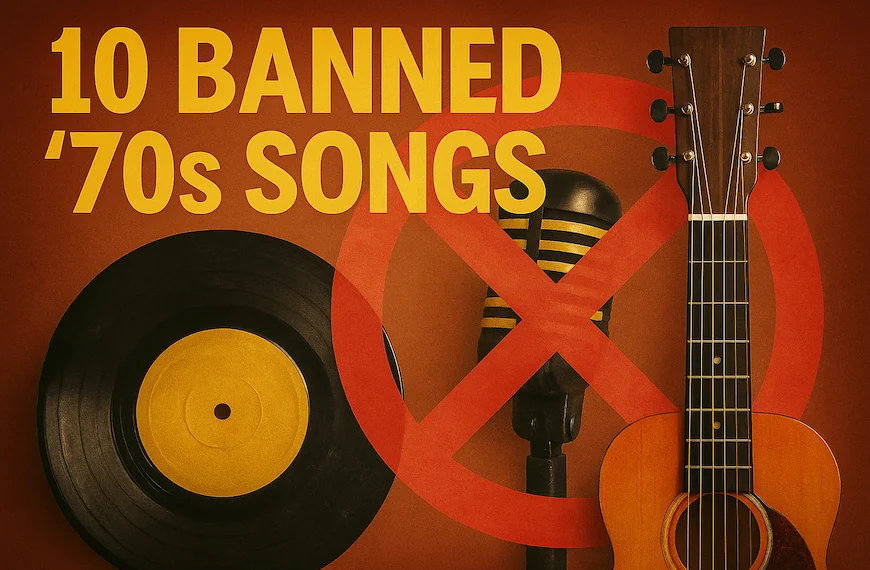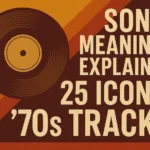The 1970s birthed punk rebellion, disco excess, and singer-songwriter honesty. It also sparked a barrage of radio bans that tried to silence songs seen as too political, erotic, or blasphemous. Some tracks were pulled by the BBC, others black-listed by American stations, yet many climbed the charts anyway. Below, we break down ten banned 70s songs, the reason behind each ban, and the legacy that proves censorship often backfires.
Why Songs Got Banned in the 70s
- Moral panic – Radio executives feared fines for indecency after the FCC publicised record penalties in 1973.
- Political pressure – Cold War tensions made protest lyrics risky for AM playlists.
- Religious outrage – Evangelical groups mailed mass complaint letters, forcing conservative stations to cave.
- Regional laws – Britain’s BBC and Australia’s ABC each had internal review panels that could yank singles overnight.
Fast Reference Table
| # | Song & Artist | Year | Who Banned It | Main Reason |
|---|---|---|---|---|
| 1 | “Lola” – The Kinks | 1970 | BBC | Brand-name beer lyric |
| 2 | “Brown Sugar” – The Rolling Stones | 1971 | US AM giants | Lyrics about slavery and sex |
| 3 | “Walk on the Wild Side” – Lou Reed | 1972 | US radio edits | Transgender references |
| 4 | “Kodachrome” – Paul Simon | 1973 | BBC | Protected trademark in title |
| 5 | “Only Women Bleed” – Alice Cooper | 1975 | Several US stations | Domestic violence theme |
| 6 | “Love to Love You Baby” – Donna Summer | 1975 | BBC late-night ban | Simulated moans deemed indecent |
| 7 | “Roxanne” – The Police | 1978 | BBC playlist freeze | Prostitution narrative |
| 8 | “God Save the Queen” – Sex Pistols | 1977 | BBC + chain stores | Anti-monarchy lyrics |
| 9 | “Short People” – Randy Newman | 1977 | Some US states | Alleged height discrimination |
| 10 | “Imagine” – John Lennon | 1971 | South Africa SABC | “No religion” lyric during apartheid |
The Ten Controversial Tracks
1. “Lola” – The Kinks (1970)
Ray Davies had to re-record one word for UK airplay. The BBC forbade brand names, so “Coca-Cola” became “cherry cola.” Despite edits, the gender-bending storyline stirred calls for a full ban, which only spiced public interest. The single hit No. 2 in Britain.
2. “Brown Sugar” – The Rolling Stones (1971)
Mick Jagger’s lyrics reference slavery, interracial sex, and drug use. Several US programmers pulled it, yet the controversy drove sales. It topped the Billboard Hot 100 and remains a stadium staple, though even Jagger has retired it from recent tours.
3. “Walk on the Wild Side” – Lou Reed (1972)
Lines about “colored girls” and transgender icons Holly and Candy pushed Reed off many daytime playlists. FM underground stations championed it, and the song peaked at No. 16 in the US, proving niche support can overpower mainstream censorship.
4. “Kodachrome” – Paul Simon (1973)
BBC policy banned songs with protected trademarks. Simon’s ode to Kodak’s film stock lost UK radio exposure, yet still cracked the American Top 10. Ironically, Kodak used the title in internal newsletters, celebrating the free publicity.
5. “Only Women Bleed” – Alice Cooper (1975)
Critics misread Cooper’s ballad about domestic abuse as misogynistic. Several US stations dropped it, but women’s groups later praised the lyrics for highlighting a hidden issue. The single reached No. 12 on Billboard.
6. “Love to Love You Baby” – Donna Summer (1975)
Seventeen minutes of moans landed Donna Summer on a BBC late-night ban list. Casablanca Records cut a shorter edit, and the track soared to No. 2 in the US, birthing the extended disco single trend.
7. “Roxanne” – The Police (1978)
The BBC froze it for three months because of its explicit nod to prostitution. Once lifted, the song climbed UK charts and introduced the band’s reggae-punk fusion to a global audience.
8. “God Save the Queen” – Sex Pistols (1977)
Released during Queen Elizabeth II’s Silver Jubilee week, lyrics comparing Britain to a fascist regime led to a BBC block and chain-store boycotts. Fans bought the single in droves by mail order, pushing it to No. 2 on the UK chart. Many swear it was actually No. 1 but “data adjusted” to avoid embarrassment.
9. “Short People” – Randy Newman (1977)
A satirical jab at prejudice, yet some US states petitioned for local bans. The song’s catchy piano riff powered it to No. 2 on Billboard, and Newman later donated royalties to height-advocacy groups as goodwill.
10. “Imagine” – John Lennon (1971)
South Africa’s apartheid government banned the track for its anti-religion line. Bootleg cassettes spread it anyway, and today “Imagine” is an anthem at global peace rallies, showing political bans rarely last.
Censorship Tactics of the Era
- Lyric edits: swapping branded or explicit words (e.g., “Lola” edit).
- Playlist freezes: BBC’s weekly “restricted” sheet halted airplay without legal action.
- Retail boycotts: Woolworths refused to stock Sex Pistols, yet mail-order sales boomed.
- Government bans: Apartheid South Africa and Francoist Spain enforced import blacklists.
- Moral ratings: US stations used “Red, Amber, Green” cards to flag questionable lyrics.
Lasting Impact on Artists
- Reverse Streisand effect: Most banned tracks sold more after censorship.
- Creative smuggling: Hidden metaphors flourished; artists like Stevie Wonder used double meanings to dodge bans.
- Format change: Long disco edits thrived on club play when radio refused them.
- Advocacy: Groups such as the Parents Music Resource Center (PMRC) formed in the 80s, citing 70s bans as precedent for warning labels.
FAQ
Were bans legally enforced or voluntary?
Most were voluntary station decisions; true legal bans happened mainly in state-controlled media markets like the BBC and SABC.
Did any artist rewrite lyrics to get airplay?
Yes. The Kinks swapped “Coca-Cola” for “cherry cola,” and Donna Summer issued a radio-safe edit of “Love to Love You Baby.”
Are these songs still banned today?
Most bans ended decades ago. “God Save the Queen” airs freely, though some stations still bleep parts of “Brown Sugar.”
Conclusion
The banned 70s songs listed here prove that controversy can fuel success rather than stop it. Radio bans raised curiosity, underground stations filled the gap, and record stores cashed in. Today, these tracks stream in remastered glory while reminding listeners that attempts to silence music often amplify its power.
Next read: Explore our Ultimate 70s Funk Playlist to hear more tracks that pushed boundaries without getting pulled. Hit play and keep the conversation spinning.













